
How Gay-Owned Brands Are Advocating for LGBTQ+ Visibility Year-Round
Over the last decade, LGBTQ+ visibility has increased dramatically across industries, but this progress is not limited to corporate marketing during Pride Month. While June remains an essential time for celebrating LGBTQ+ identities, many gay-owned brands advocate for LGBTQ+ visibility year-round. These brands use their platforms, products, and services to ensure that the LGBTQ+ community remains a visible and integral part of society, promoting inclusion, awareness, and equality every day of the year.
This blog explores how gay-owned businesses lead the charge in advocating for LGBTQ+ visibility beyond Pride Month, how their actions contribute to societal change, and the impact they have on the advertising industry and consumer culture.
1. Year-Round LGBTQ+ Inclusion: More Than a Seasonal Strategy
LGBTQ+ visibility is more than rainbow logos in June; it’s about fostering a constant sense of inclusion in all aspects of life. Gay-owned brands, aware of the challenges and misrepresentation faced by the LGBTQ+ community, are particularly driven to embed inclusivity in their business models year-round.
One reason LGBTQ+ visibility cannot be confined to one month is the year-round discrimination that the community faces. Gay-owned brands are well aware that LGBTQ+ consumers are often marginalized in media, advertising, and even workplace environments. These companies, in response, intentionally prioritize authentic representation and inclusion to ensure their customers feel seen and valued 365 days a year.
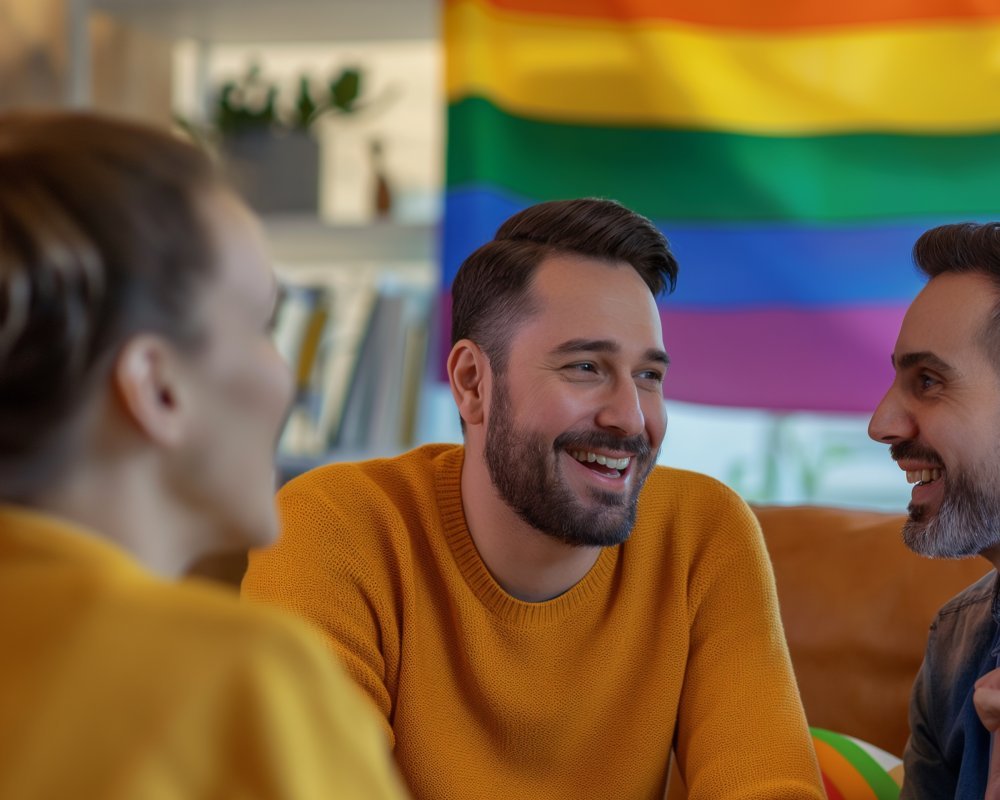
Example: TomboyX
TomboyX, founded by Fran Dunaway and Naomi Gonzalez, is a gay-owned, gender-neutral underwear and apparel brand that challenges traditional gender norms. TomboyX prides itself on advocating for LGBTQ+ visibility every day, not just during Pride. The brand focuses on inclusive marketing that speaks to a wide spectrum of gender identities, with representation spanning different races, sizes, and body types.
Through its marketing campaigns, TomboyX promotes self-expression and celebrates individuals who defy societal norms. By doing so, they ensure that their LGBTQ+ audience feels seen and respected all year round, contributing to a more inclusive world in which diversity is celebrated daily.
TomboyX also advocates for LGBTQ+ rights through collaborations with advocacy groups like the National Center for Transgender Equality and GLAAD. By engaging in these partnerships and supporting LGBTQ+ organizations, TomboyX leverages its brand for the greater good and amplifies LGBTQ+ voices across industries.
Advertisement · Scroll to continue
Recommended
2. Authenticity in Marketing: Breaking Away from ‘Rainbow-Washing’
One challenge LGBTQ+ brands face, especially around Pride, is avoiding “rainbow-washing” — a term used to describe companies that merely add rainbow colors to their branding during Pride Month without backing up their efforts with meaningful support for the LGBTQ+ community.
Gay-owned businesses understand the importance of authenticity, and they continuously work to ensure that their LGBTQ+ visibility is part of an ongoing commitment to the community rather than a temporary marketing ploy. By embedding LGBTQ+ advocacy into their brand values, they offer authentic representation and support for the community.
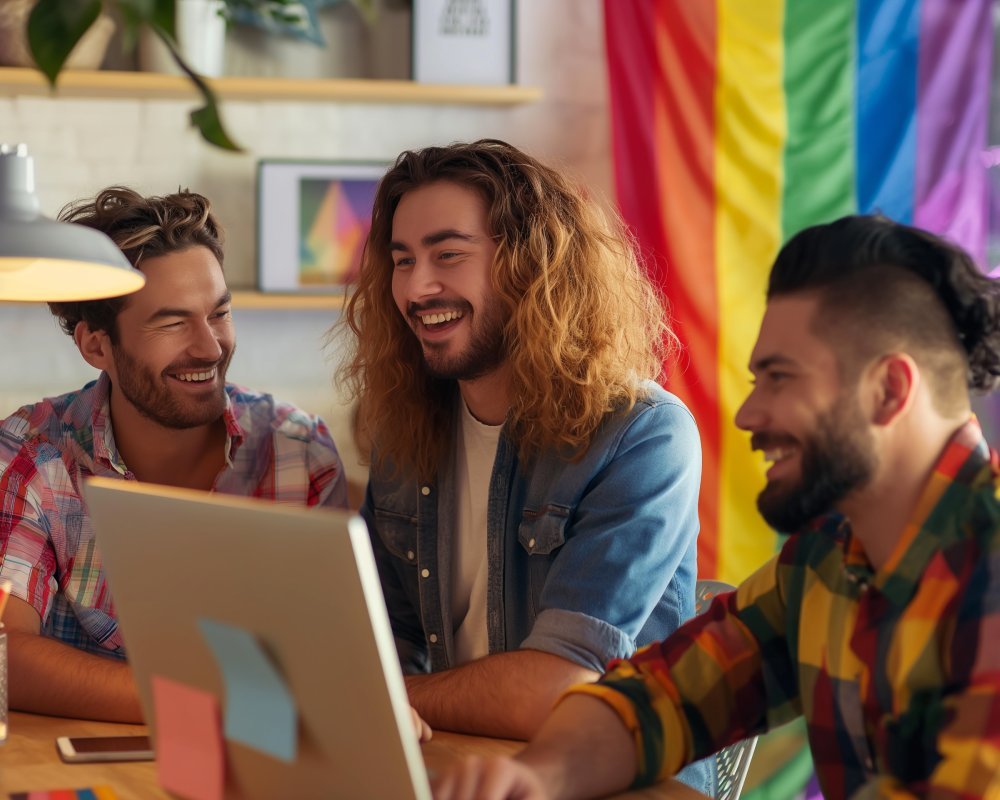
Example: Equator Coffees
Equator Coffees, a gay-owned coffee company founded by Helen Russell and Brooke McDonnell, has long advocated for LGBTQ+ visibility through its ethical business practices and commitment to social responsibility. Beyond serving exceptional coffee, Equator Coffees ensures that their LGBTQ+ advocacy permeates everything they do — from their internal culture to their external partnerships.
Equator Coffees supports numerous LGBTQ+ causes and events, including sponsoring LGBTQ+ film festivals and community centers. They also work to promote equality in the workplace and donate to organizations that champion LGBTQ+ rights. These year-round initiatives ensure that Equator Coffees’ advocacy goes beyond surface-level marketing, making their support for the LGBTQ+ community both tangible and authentic.
3. Creating LGBTQ+ Inclusive Workspaces and Products
Beyond external marketing, gay-owned brands often start by making their internal environments inclusive. A major part of their year-round advocacy for LGBTQ+ visibility is ensuring that their workplaces are safe and welcoming for LGBTQ+ employees. By creating LGBTQ+ inclusive policies, these brands lead by example, showing that inclusion isn’t just an outward-facing marketing strategy but an integral part of their corporate culture.
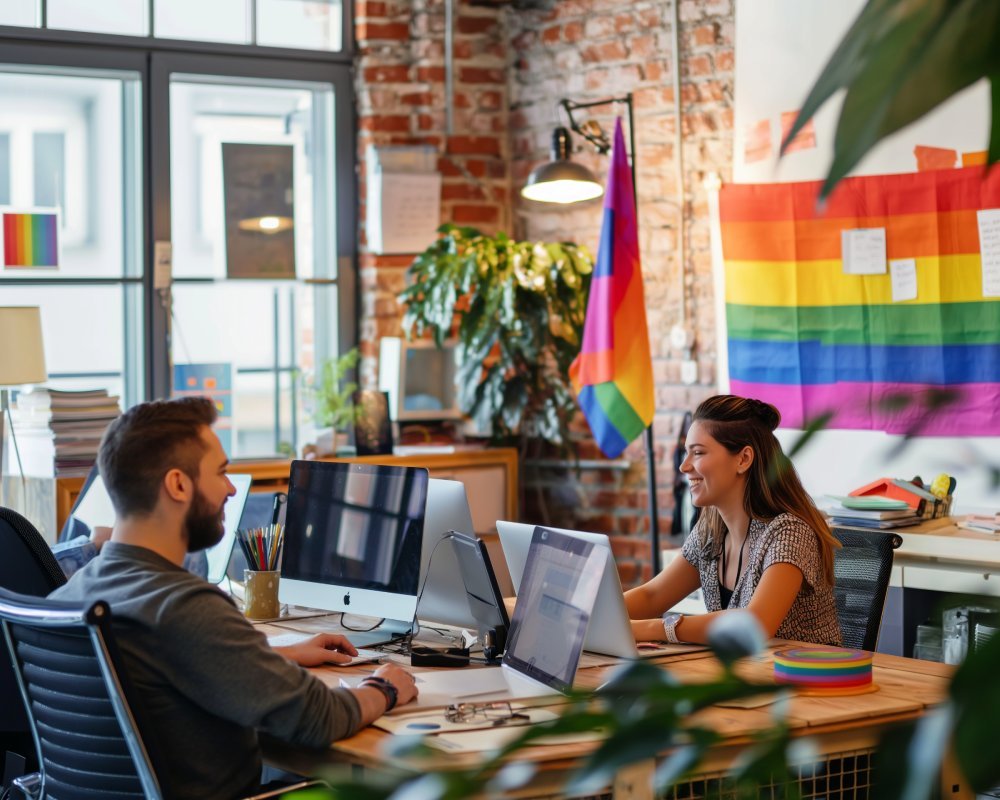
Advertisement · Scroll to continue
Recommended
Example: Rad Power Bikes
Rad Power Bikes, co-founded by Ty Collins, is an LGBTQ+-owned electric bike company known for its environmentally friendly products and commitment to diversity and inclusion. Rad Power Bikes has taken great strides in building a workplace culture that values LGBTQ+ employees and promotes a sense of belonging.
One of the ways Rad Power Bikes advocates for year-round LGBTQ+ visibility is through its employee resource groups (ERGs) and diversity training initiatives. The company encourages open conversations about identity and inclusion and ensures that LGBTQ+ voices are heard at all levels of the organization. These efforts not only help Rad Power Bikes create a more inclusive workspace but also ensure that the company’s LGBTQ+ advocacy is built into its internal structure.
Externally, Rad Power Bikes has launched campaigns that promote LGBTQ+ equality and environmental sustainability, reinforcing their commitment to both social justice and eco-consciousness. Their focus on making the world better for future generations aligns with their dedication to LGBTQ+ rights and visibility, making their efforts both purposeful and long-lasting.
4. Collaborations with LGBTQ+ Organizations
Another way gay-owned brands advocate for LGBTQ+ visibility year-round is through collaborations with LGBTQ+ organizations. These partnerships go beyond financial donations; they foster deep relationships between businesses and community groups, leveraging the power of both to make a greater impact.
By working alongside LGBTQ+ nonprofits, these brands help raise awareness of issues affecting the community, drive resources toward social causes, and provide platforms for LGBTQ+ voices. Through these collaborations, gay-owned businesses create opportunities for LGBTQ+ people to thrive.
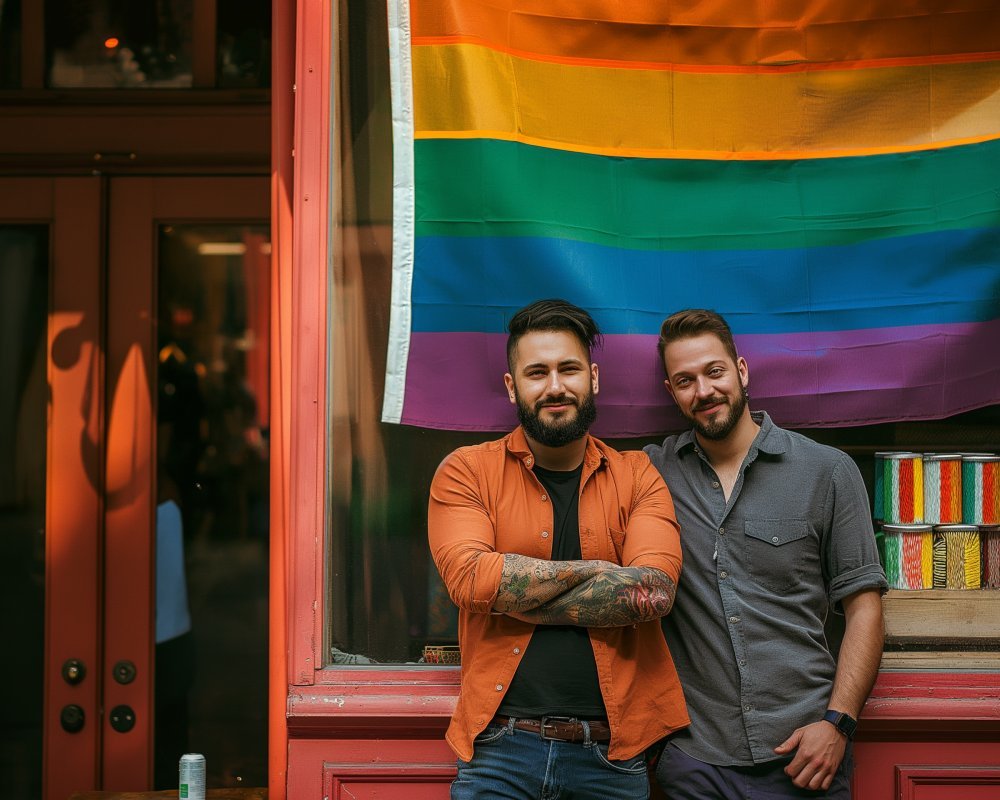
Example: The Phluid Project
The Phluid Project, founded by Rob Smith, is a gender-free fashion brand and lifestyle platform that has made LGBTQ+ advocacy central to its mission. The Phluid Project not only produces gender-neutral clothing and accessories but also serves as a hub for LGBTQ+ activism. Through its charitable arm, The Phluid Phoundation, the brand supports LGBTQ+ youth initiatives, including those that focus on mental health, homelessness, and educational access.
The Phluid Project works closely with LGBTQ+ organizations, including The Trevor Project, GLSEN (Gay, Lesbian & Straight Education Network), and the Ali Forney Center, to provide ongoing support to the LGBTQ+ community. By collaborating with these nonprofits, The Phluid Project amplifies the voices of marginalized LGBTQ+ individuals and helps build a more inclusive society year-round.
One of their key initiatives is “Give Back Friday,” an annual event during which they donate 20% of all sales to LGBTQ+ organizations, ensuring that their business is directly contributing to positive social change. This collaboration-driven model shows how gay-owned businesses can use their resources and influence to create real, lasting impacts for the LGBTQ+ community.
5. Leveraging Digital Platforms for LGBTQ+ Advocacy
In today’s digital age, gay-owned businesses have leveraged social media and online platforms to create spaces for LGBTQ+ visibility and engagement. Through creative campaigns, storytelling, and community building, these brands use their digital presence to advocate for LGBTQ+ visibility on a global scale.

Example: GayWine
GayWine, a gay-owned wine brand founded by Matt Grove and Josh Stein, has become a beacon of LGBTQ+ visibility within the wine industry, using digital platforms to expand its reach and engage with LGBTQ+ audiences year-round. GayWine has embraced social media and online marketing to celebrate the LGBTQ+ community and break down barriers in a traditionally conservative industry.
By hosting virtual events, sharing stories from LGBTQ+ individuals in the wine industry, and promoting inclusive content, GayWine ensures that its commitment to LGBTQ+ advocacy remains strong throughout the year. Their digital campaigns feature LGBTQ+ sommeliers, winemakers, and other industry professionals, bringing visibility to underrepresented voices in wine culture.
Additionally, GayWine has used its platform to raise funds for LGBTQ+ nonprofits, including GLAAD and The LGBTQ+ Freedom Fund. By aligning its brand with causes that support equality, GayWine ensures that its digital presence is more than just promotional; it’s a force for social change and LGBTQ+ advocacy.
6. Advocating for Legislative and Policy Change
While marketing campaigns and product-based advocacy are important, some gay-owned businesses take their advocacy a step further by engaging in political activism. These companies understand that real change requires more than just visibility — it demands action on a legislative level. By advocating for policy changes that protect LGBTQ+ rights, these brands use their influence to make structural changes that benefit the community as a whole.

Example: Sweetgreen
Sweetgreen, co-founded by Jonathan Neman and Nicolas Jammet, is a fast-casual restaurant chain that has made sustainability and inclusivity part of its core mission. Although Sweetgreen is not solely focused on LGBTQ+ issues, the company has been vocal about its support for LGBTQ+ rights, particularly when it comes to legislative matters.
Sweetgreen has publicly supported LGBTQ+ equality and human rights initiatives, including campaigns for anti-discrimination laws and marriage equality. The brand also promotes inclusive hiring practices, ensuring that LGBTQ+ employees are treated with respect and fairness across all locations.
In 2020, Sweetgreen took a public stand against discriminatory policies, voicing its opposition to laws that would harm LGBTQ+ individuals and supporting organizations like the Human Rights Campaign. Their involvement in advocacy for policy change shows that gay-owned businesses can influence more than just their industries — they can also push for broader societal progress through political engagement.
7. Building LGBTQ+ Communities Around Shared Experiences
Finally, one of the most powerful ways gay-owned brands advocate for LGBTQ+ visibility year-round is by building communities around shared experiences. Many LGBTQ+ businesses create safe spaces — both physical and virtual — where people can connect, share stories, and feel a sense of belonging.
These brands act as community hubs, fostering a sense of solidarity among LGBTQ+ individuals and allies. Through events, storytelling, and cultural initiatives, they create environments where LGBTQ+ visibility is not just present but celebrated.
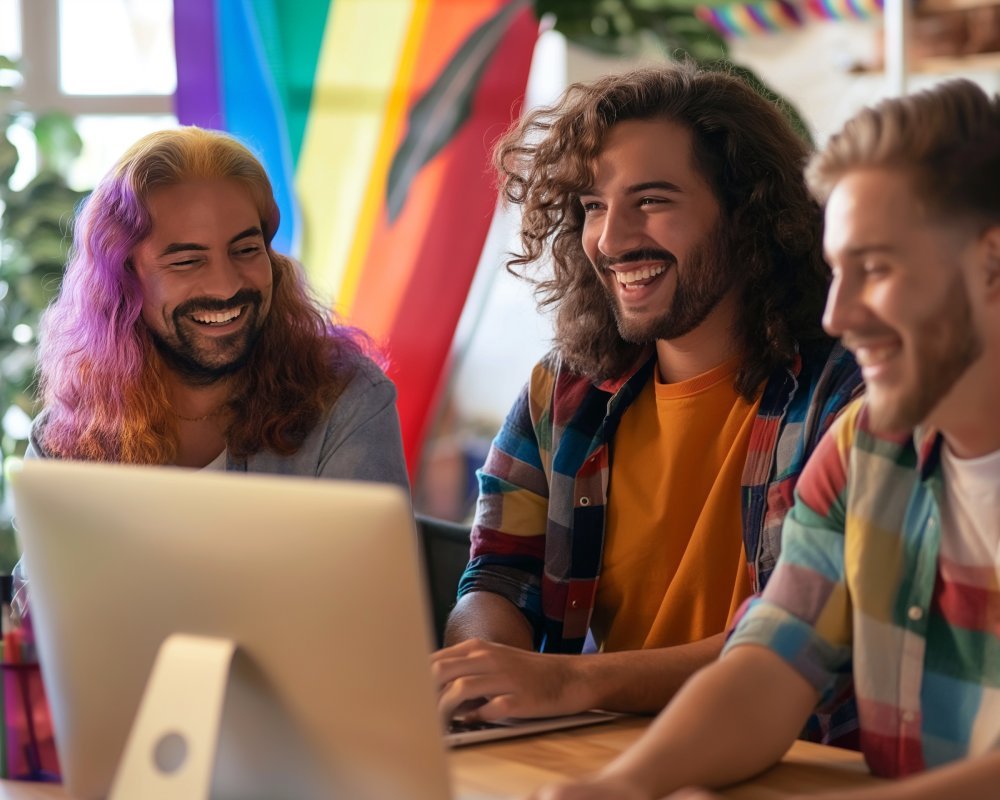
Example: Autostraddle
Autostraddle, an LGBTQ+ media platform founded by Riese Bernard and Laneia Jones, is a perfect example of a gay-owned brand that has built a community around shared experiences. As one of the few independent, queer-run media outlets, Autostraddle focuses on creating content that centers LGBTQ+ women, non-binary individuals, and trans people.
The platform has created a sense of belonging for readers through its deeply personal articles, op-eds, and advice columns. Autostraddle’s mission is to provide a space for LGBTQ+ voices that are often left out of mainstream media. With a team composed primarily of LGBTQ+ individuals, Autostraddle ensures that their content is not only representative but also reflective of the community’s lived experiences.
Autostraddle also hosts annual events, such as A-Camp, which brings together LGBTQ+ individuals from around the world for workshops, performances, and bonding experiences. By building a community that uplifts LGBTQ+ voices, Autostraddle is a year-round advocate for visibility, representation, and inclusion.
Conclusion
The success of gay-owned brands in advocating for LGBTQ+ visibility year-round goes far beyond seasonal campaigns or token gestures. These businesses have embraced inclusivity as a core value, incorporating it into every aspect of their operations — from marketing and product design to workplace policies and social responsibility initiatives.
Through authentic representation, collaboration with LGBTQ+ organizations, political activism, and community building, these brands are helping to create a world where LGBTQ+ individuals are seen, heard, and valued every day of the year. Their commitment to visibility serves as a powerful reminder that advocacy for LGBTQ+ rights and inclusion doesn’t end after Pride Month. It’s a continuous journey that requires unwavering dedication, bold action, and a deep understanding of the importance of representation.
By supporting gay-owned businesses and their year-round advocacy efforts, consumers can help foster a more inclusive world where diversity is celebrated, and LGBTQ+ voices are amplified.
Advertisement · Scroll to continue

More Recommended
What Does ‘Pink Pony Club’ Mean in the LGBTQ+ Community? Meaning Behind Pink Pony Club Explained
What Does ‘Pink Pony Club’ Mean in the LGBTQ+ Community? Meaning Behind Pink Pony Club [...]
How to Navigate Gay Relationships with Cultural Differences
How to Navigate Gay Relationships with Cultural Differences – Navigating a gay relationship can be [...]
Can a Gay Man Join the United States Army?
Can a Gay Man Join the United States Army? – Can a Gay Man Join [...]
The Success Stories of Gay-Owned Brands in the Marketing World
Celebrating Diversity: The Success Stories of Gay-Owned Brands in the Marketing World Diversity and inclusivity [...]
Lesbian Dinosaur Jokes: That Are Prehistorically Funny
Lesbian Dinosaur Jokes: That Are Prehistorically Funny – Extinct? Never. Hilarious? Always. Laugh through time [...]
SEO-Friendly Content Ideas for Gay Blogs
SEO-Friendly Content Ideas for Gay Blogs In today’s digital age, it is essential for businesses [...]
85% of Men Are Bisexual or Bi-Curious
85% of Men Are Bisexual or Bi-Curious: Understanding the Spectrum of Male Sexuality The idea [...]
Diversity and Inclusion in Marketing: How LGBTQ+ Agencies are Leading the Way
Diversity and Inclusion in Marketing: How LGBTQ+ Agencies are Leading the Way – Diversity and [...]
How Gay-Owned Companies are Making their Mark in Advertising
How Gay-Owned Companies are Making their Mark in Advertising In today’s world, visibility and representation [...]